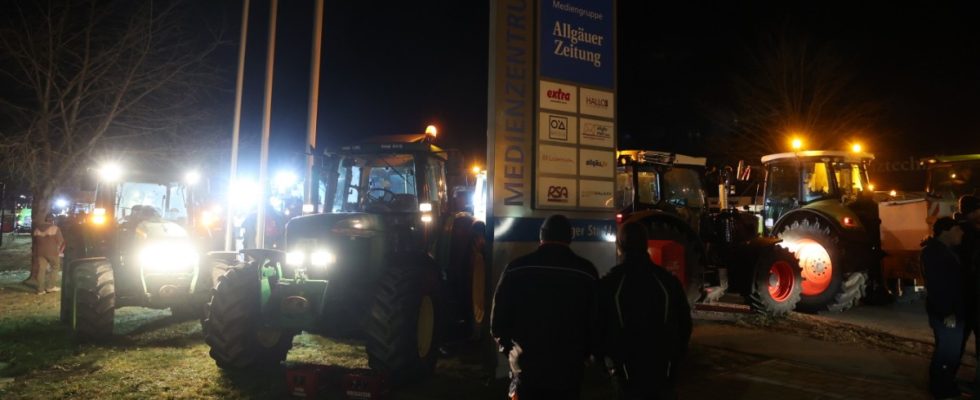When it comes to the attention and media coverage of the farmers’ protests that have been going on for weeks, the Bavarian Farmers’ Association is actually quite satisfied. “The criticism of the federal government’s plans is loud and justified. The farmers’ protests are causing major political waves and are attracting enormous social and media attention,” says General Secretary Carl von Butler. The protest that some farmers staged in front of the media center on Monday night is all the more unfortunate for the farmers’ association Allgäu newspaper organized, apparently because they don’t feel heard enough: the farmers blocked the access roads, hindered the export of the newspaper and, according to the Bavarian Journalists’ Association, created a threatening backdrop in an attempt to influence the reporting. The unregistered protest was resolved peacefully – the police in Kempten are still investigating the initial suspicion of coercion.
As early as January 9th, a few farmers tried to contact the editorial team Franconian day in Bamberg, in the past few days, for example, the NDR in Lower Saxony and the BR in Unterföhring were also affected. With the difference that the protest at Bavarian Radio including a conversation with the editor-in-chief and was therefore unproblematic. With the blockade at the Allgäu newspaper But, not only the police in Kempten believe, the farmers have “crossed a line”. And Butler from the Farmers’ Association also says: “The Bavarian Farmers’ Association’s position on freedom of the press and freedom of expression is clear: actions that restrict it or hinder free, independent reporting are unacceptable and cannot be tolerated.”
According to the police, the farmers drove up to the media center in Kempten at around 10:30 p.m.: 400 participants came together, with around 175 tractors and 30 cars. They only left around midnight. It was an action, says Markus Raffler, editorial director of Allgäu newspaper, “which we do not know in the way we did and did not expect.” According to the Allgäuer Zeitung, the farmers presented the protest as a “cry for help” because they felt let down by politicians and their concerns were not adequately and sometimes incorrectly portrayed by the media. The newspaper’s management and editorial board made it clear that actions of this kind could not be tolerated.
Raffler says: “All in all, the farmers were probably a bit helpless when it came to talking to us.” A round of discussions has now taken place with representatives of the newspaper, farmers, the Bavarian Farmers’ Association, the city of Kempten, the Oberallgäu district and the Kempten public prosecutor’s office. “It was a very good conversation,” emphasizes Raffler. The editorial team showed the farmers on a pin board how extensively the paper had reported on the protests. But he says the editorial team would have called a round of discussions differently. “It wouldn’t have needed such a threatening backdrop.”
But the damage, especially to the cause of farmers, has been done. In a statement, the Swabia South/West Police Headquarters felt compelled to clarify that the situation in the context of the farmers’ protests must not escalate further and that the law must be adhered to. “The attempt to exert influence through an unannounced gathering and temporary blockades is unacceptable and cannot be reconciled with the principle of the rule of law in a democracy.” The Bavarian Journalists’ Association speaks of an “attack on press freedom.” Letters to the editor and discussions are the right way to exchange different opinions.
“We are observing that attacks on the press among protesting farmers are becoming more targeted and are finding more supporters,” says Andrea Roth, deputy chairwoman of the BJV. “Stopping this development is also the responsibility of the Bavarian Farmers’ Association.” Its general secretary, von Butler, clearly distances himself from the action and says that free, independent reporting as well as freedom of assembly, demonstration and expression are vital for agriculture and all other social or economic groups in order to make themselves heard. Discussions and exchanges are important and valuable.
She wants such an exchange Allgäu newspaper continue to work with farmers. With the sensible representatives, as editorial director Raffler says. In his opinion, a partly inhomogeneous group demonstrated in front of the media center in Kempten, which does not only have the concerns of the farmers in mind. His newspaper wants to continue to report intensively on agricultural topics in order to inform the public about the problems of this profession.

